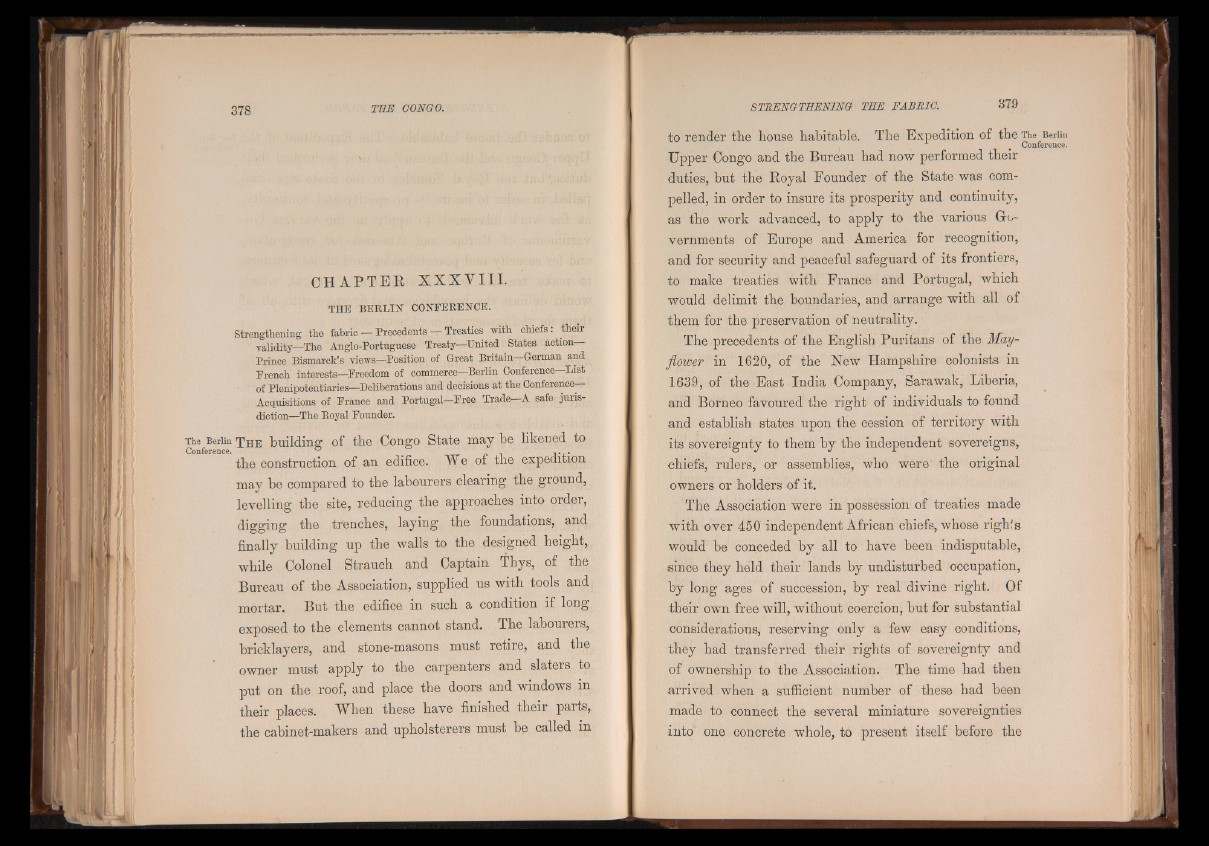
C H A P T E R X X X V I I I .
THE BERLIN CONFERENCE.
Strengthening the fabric — Precedents — Treaties -with chiefs : their
validity—The Anglo-Portnguese Treaty—United States action
Prince Bismarck’s views—Position of Great Britain German and
French interests—Freedom of commerce—Berlin Conference—List
of Plenipotentiaries—Deliberations and decisions at the Conference
Acquisitions of France and Portugal—Free Trade A safe jurisdiction—
The Royal Founder.
The Berlin 'J 'j j j ; b u i l d i n g of the Congo State may be likened to
Conference. ° „ . . .
tbe construction of an edifice. We of the expedition
may be compared to tbe labourers clearing tbe ground,
levelling tbe site, reducing the approaches into order,
digging the trenches, laying tbe foundations, and
finally building up tbe walls to tbe designed height,
while Colonel Straucb and Captain Thys, of tbe
Bureau of tbe Association, supplied us with tools and
mortar. But tbe edifice in such a condition if long
exposed to tbe elements cannot stand. Tbe labourers,
bricklayers, and stone-masons must retire, and tbe
owner must apply to tbe carpenters and slaters to
put on tbe roof, and place tbe doors and windows in
tbeir places. When these have finished their parts,
tbe cabinet-makers and upholsterers must be called in
to render tbe bouse habitable. Tbe Expedition of tbe The Berlin Conference.
Upper Congo and tbe Bureau had now performed tbeir
duties, but the Royal Founder of the State was compelled,
in order to insure its prosperity and continuity,
as tbe work advanced, to apply to tbe various Governments
of Europe and America for recognition,
and for security and peaceful safeguard of its frontiers,
to make treaties with France and Portugal, which
would delimit tbe boundaries, and arrange with all of
them for tbe preservation of neutrality.
Tbe precedents of tbe English Puritans of tbe Mayflower
in 1620, of tbe Xew Hampshire colonists in
1639, of tbe East India Company, Sarawak, Liberia,
and Borneo favoured tbe right of individuals to found
and establish states upon tbe cession of territory with
its sovereignty to them by tbe independent sovereigns,
chiefs, rulers, or assemblies, who were tbe original
owners or holders of it.
Tbe Association were in possession of treaties made
with over 450 independent African chiefs, whose rights
would be conceded by all to have been indisputable,
since they held tbeir lands by undisturbed occupation,
by long ages of succession, by real divine right. Of
their own free will, without coercion, but for substantial
considerations, reserving only a few easy conditions,
they bad transferred tbeir rights of sovereignty and
of ownership to the Association. Tbe time bad then
arrived when a sufficient number of these bad been
made to connect tbe several miniature sovereignties
into" one concrete whole, to present itself before tbe